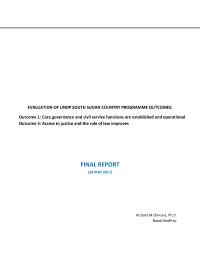
UNDP South Sudan 2013-2016 CPD Outcomes 1 & 5 Evaluation
Output 2.1. Parliaments, constitution making bodies and electoral institutions enabled to perform core functions for improved accountability, participation and representation, including for peaceful transitions
Output 2.2. Institutions and systems enabled to address awareness, prevention and enforcement of anti-corruption measures across sectors and stakeholders
Output 3.2. Functions, financing and capacity of sub-national level institutions enabled to deliver improved basic services and respond to priorities voiced by the public
Output 3.5 Communities empowered and security sector institutions enabled for increased citizen safety and reduced levels of armed violence
Output 4.2. Measures in place and implemented across sectors to prevent and respond to Sexual and Gender Based Violence (SGBV)
Output 3.4. Functions, financing and capacity of rule of law institutions enabled, including to improve access to justice and redress
1: Cross-cutting Development Issue
2: Democratic Governance
3: Others
4: Poverty and MDG


